It was in July 24 years ago that, riding my bike near
Airdrie, in Lanarkshire, I came across a scene that’s been in my mind a fair
amount recently. Cycling from Glasgow , my home
city, to Edinburgh ,
I passed through a village whose kerb stones were painted alternately red,
white and blue. There was bunting strung between the buildings above, also in
the colours of the union flag.
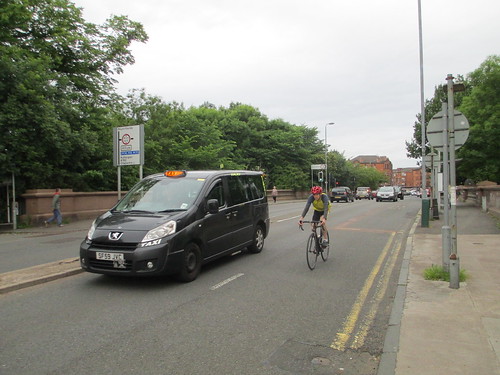 |
| A cyclist in Cathcart, on Glasgow's south side, an area with whose streets I was once intimately familiar |
Anyone familiar with central Scotland will know what I’d come
upon. The village was a stronghold of loyalism, the ideology that aligns
low-church Protestantism with fanatical loyalty to the British state. The
sentiment’s heartlands are Northern Ireland
– which loyalists are determined not to let join the Irish Republic Battle of the Boyne, a key
historic event for loyalists, in which William of Orange, a Protestant,
defeated James II, the UK ’s
last Roman Catholic king. James was driven into exile, from which he never returned.
That village has been in my mind because Scotland ’s membership of the United Kingdom ,
the state that formed me and that commands loyalists’ loyalty, is in question
in a way I’d never have imagined in 1990. In a referendum on September 18,
Scotland – the bit of the UK where I grew up, was educated, learned to ride a bike, got married and
started work – could vote to separate from England, where my wife, one of our children and I were born. I’ve spent all of my adult life since 1997 in either England , Hungary
or the United States . But my mother, sister, nephews and niece still live in Scotland .
My mind has drifted to the potential split again and again
as I’ve been riding to and from work the last few weeks. Although I’m watching
developments from 3,500 miles away, this isn’t to me an academic question of
geopolitics. It’s about a widening schism in my soul.
It’s partly because of two summers - 1989 and 1990 - that the schism feels
so painful.
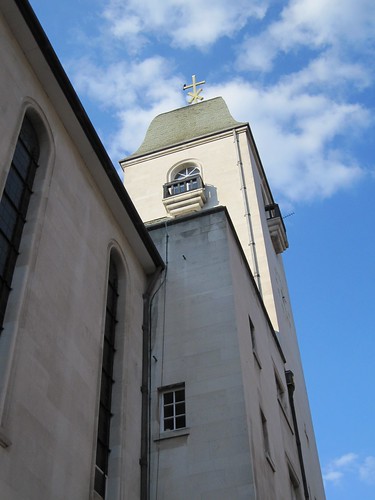 |
| St Columba's Church of Scotland in London: I was baptised here as a child, in a building that symbolises much about Anglo-Scottish identity |
I was nevertheless shaped by some distinctly Scottish
institutions. Our community was a local parish of the Presbyterian Church of
Scotland. My education taught me thoroughness and a certain toughness of
thinking. It reflected, I think, how Scotland ’s
intellectual climate is a little more dogmatic and a little less pragmatic than
England ’s.
Our school debating club and Glaswegians’ fondness for the withering, harsh put
down sharpened my sense of humour and gave it a hard edge.
But those two summers - between my second and third and third a fourth years at university - made me appreciate the country far more fully. My grandfather had to go into a nursing home in Edinburgh in summer 1989 - a process with which I helped him - and, by summer 1990, he had, sadly, died. On days
when I wasn't needed to help with grandpa or his house, I could cycle north and soon find myself riding amid lush vegetation on
the steep sides of a sea loch. I could ride south and cycle atop windswept
moors. Ride east and I was speeding towards the gentle hills and old towns of Fife . Ride west and I could zig-zag down the coast of the
Firth of Clyde. With all its flaws, the country – the miserable former mining
villages and non-descript shopping arcades as well as the baronial castles,
glittering sea lochs and twisting river valleys – felt like the landscape of
home.
I don’t feel that the I whom those experiences in Scotland shaped need be any less a Scot now that
I start my daily bike rides in Brooklyn than when I started them on the south
side of Glasgow .
But there are certainly senses in which I’ve grown more
distant from my homeland. The yearning for the bustle of London , where I felt a substantially freer, drew me south in 1997. A still greater
wanderlust sent us from there to Hungary for four-and-a-half years.
After another nine years in London , we’ve been
in New York
for two.
 |
| A fishing boat on a Scottish sea loch: the kind of scene I discovered was just a short-ish bike ride from home. |
I feel, in short, a bit Scottish, a bit British – even a bit of a New Yorker. Looking back in my father’s family, I see generations who must
have felt the same. An eccentric great-great uncle of mine designed the road on
which I rode through Lanarkshire in 1990. I discovered among some family
papers that another forebear – a proud Scot – once ran a doctor’s surgery round
the corner from where we lived in south London.
My heart used to swell with pride when I worked in central Edinburgh, cycled home up the Royal Mile and pondered how David Hume, Adam Smith and other giants of the Scottish Enlightenment had worked in the same area. I also felt proud, however, when I parked my bike daily in London by the site where Shakespeare produced the first performances of many of his plays. The enlightenment thinkers, Shakespeare and geniuses from different parts of the UK have constructed an unusually rich, diverse culture that the UK's constituents share. I believe the whole is greater than the sum of the parts.
The millions of personal ties across the UK's internal frontiers, that cultural heritage and some shared British characteristics - a distrust of high-flown rhetoric, reserve with others and reluctance to make a fuss - seem to me more significant than the points that divide the peoples.
My heart used to swell with pride when I worked in central Edinburgh, cycled home up the Royal Mile and pondered how David Hume, Adam Smith and other giants of the Scottish Enlightenment had worked in the same area. I also felt proud, however, when I parked my bike daily in London by the site where Shakespeare produced the first performances of many of his plays. The enlightenment thinkers, Shakespeare and geniuses from different parts of the UK have constructed an unusually rich, diverse culture that the UK's constituents share. I believe the whole is greater than the sum of the parts.
The millions of personal ties across the UK's internal frontiers, that cultural heritage and some shared British characteristics - a distrust of high-flown rhetoric, reserve with others and reluctance to make a fuss - seem to me more significant than the points that divide the peoples.
I recognise that to independence supporters these
points will seem nebulous – even perhaps a betrayal of this blog’s avowed
distaste for policy-making by reference to the gut rather than the cerebral
cortex. I do in fact have considerable policy concerns about the
prospects for an independent Scotland .
I’ve covered the affairs of many small, open economies and think the risks
facing a country dependent on oil and financial services with messy fiscal and currency affairs are substantial. It’s long been clear to me –
although Scottish nationalists have somehow persuaded people that this isn’t
the case – that Scotland ’s
public spending is buttressed by considerable transfers from the wider UK . The end of
those would cause considerable pain to ordinary Scots, especially those dependent on state benefits or working for the public sector.
I’m also sceptical that Scotland
is somehow more virtuous or nurtures better political instincts than the wider UK . The scene I
encountered in Lanarkshire is a reminder, for example, that Scotland has clung far longer than most of England or Wales to sectarianism between
Protestants and Roman Catholics. Nor is it clear to me that a free-standing Scotland is fated to be better run than the UK . In the policy
areas closest to my heart, the devolved Scottish government has built a destructive motorway across the south of Glasgow
and undertaken the mind-bogglingly inane Niceway Code “share the road”campaign. The vigorous contest of ideas that comes from belonging to a larger
state can be beneficial in making public policy operate better.
But, to me, living and cycling daily in New York City and without a vote on September
18, the biggest issues are emotional. The different bits of my background don’t
feel to me like they should be on different sides of the bitter, angry debate
that the independence referendum has stirred up. I don’t share the loyalists’ belligerent
idea of British identity but love how the UK has balanced over the years different
legal, historical, linguistic and religious traditions to make what seems to me a better whole.
If I wake on the morning of September 19th to find my fellow Scots have voted to leave that enterprise, I’ll still get on my bike, ride to work and get on with business. If I get into a dispute with a driver or chat to a fellow cyclist, I’ll still be just some big British person with an especially hard-to-understand accent. Inside me, however, part of my identity will feel torn and there’ll be a deep sorrow. I’m hoping, despite the current trend in the opinion polls, that I don’t have to feel it.
If I wake on the morning of September 19th to find my fellow Scots have voted to leave that enterprise, I’ll still get on my bike, ride to work and get on with business. If I get into a dispute with a driver or chat to a fellow cyclist, I’ll still be just some big British person with an especially hard-to-understand accent. Inside me, however, part of my identity will feel torn and there’ll be a deep sorrow. I’m hoping, despite the current trend in the opinion polls, that I don’t have to feel it.
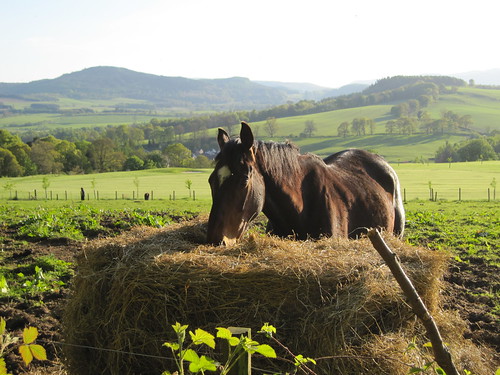
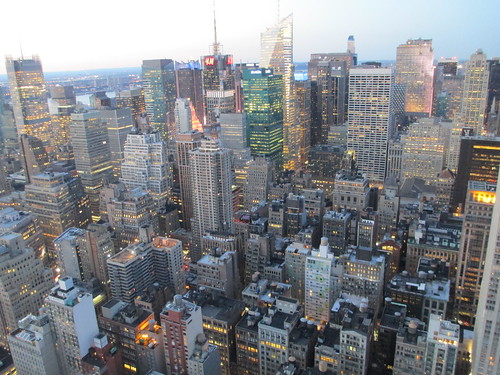
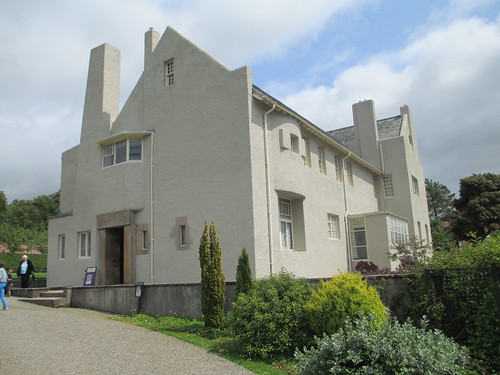
Very thought-provoking and informative post. As I consider its points, I'm struck by the tendency of humans c.2014 to be single problem, single solution analysts and advocates, when many of our challenges are systemic rather than single caused, requiring complex systematic solutions rather than bold simple strokes of a sword. Niceways Code alone is obviously no solution, but on the other hand I doubt that throwing down my bike in the middle of the road and yelling curse words at motorists alone is going to make things better, either. A more complex and nuanced understanding of the problems we're trying to solve, their histories both personal and collective, their constituencies, and the human factors behind them, would surely raise our problem-solving game higher than the single cause single solution approach. The Council of Trent took almost 20 years, and is arguably one of the most successful analytical, doctrinal, and political endeavors of all time. Clarification and understanding of the dimensions of a problem, leading to open and thorough discussion of goals and objectives, both in order to ensure that these are well understood in order to give a basis for evaluating the benefits of proposed solutions to fit with them while also analyzing the costs and risks of the possible solutions, requires both time and agreeableness. But systems analysis is a skill that appears to be lacking, an assertion easily seen by blog posts about Niceways that I went and read post this post, as well as by reviewing the talking points and advertisements of both sides of critical issues like Scottish Independence which try to move the masses with single-issue lowest common denominator focus, apparently because this approach is cost-effective. I suggest that history will judge us, cyclists trying to advance our cause, as well as the main players in the Scottish Independence vote of 2014, not on how loudly we yelled at each other or on how well we moved the polls with shrill advertisements, but on rather broader and deeper parameters: how well did we understand the problem, how well did we analyze it, how effective were the solutions we implemented. In that respect, in the longer view of history, I don't believe the record of our words and actions in 2014 will be paint us in a very positive light at all. We'll see.
ReplyDeleteJRA,
DeleteThank you for that thoughtful response. I often think about how history will judge the things we write and say - including the contents of this blog. One side of the independence referendum debate will no doubt end up looking foolish as a result of the current campaign - I just hope it's the yes campaign. Similarly, cyclists' current conviction that history is on our side will either make us look, in retrospect, either as if we were in the vanguard of a great change or a bunch of eccentrics. Clearly, I'm hoping it's the former.
I hope all is well with you out there in the desert.
All the best,
Invisible.
Robert -
ReplyDeleteThanks for a very considered, almost wistful piece of writing. I agree that thinking with the gut is not enough, but there is something attractive about your writing when it so obviously comes from the heart and from experience, and is so well put together.
As you know from a Facebook skirmish a few months back (sorry that it got so heated), my heart is decidedly with the yes camp: I hear you on the sectarian question, but the broad English equivalents are the class obsession and the anti-European agenda; I hear you on the risks of a small country going it alone relying on oil and financial services, but then note that Scotland (like certain other parts of the UK) is still paying the price (with food banks and unemployment) for the Square Mile's recklessness in 2007-8, while the perpetrators come back with impunity (or proper regulation) to their old ways and greed, with no promise that we shall not revisit the economic meltdown in an intact UK in time to come...the UK relies on financial services, anyway.
So your lovely writing does not ultimately sway me (though I confess your senior manager's words rather underlines the point in my mind that there are at least two Britains!!)...
But above all, it's the road and not the woad, and wherever that road leads, I do hope our friendship remains, for a man's a man for a' that...
God bless you and yours,
Andrew Monty.
Andrew,
DeleteThank you for your kind words.
I think there are a lot of false dichotomies knocking around in this debate. One of the most serious - which I think has a lot of currency in Scotland - is the idea that the costs of the bailout and financial crash were a result uniquely of irresponsibility in the City of London. RBS, based in Edinburgh, received the most money in the bailout, while Lloyds Banking Group, which rescued HBOS, received the second-biggest cash injection from the state. I can't see that an independent Scotland could have afforded the bailouts involved and I don't believe that Alec Salmond, who was calling before 2008 for the UK Treasury to relax regulation of the banks to make them more competitive, would have been any more prudent in regulating the banks than the UK Treasury was. I find the UK-wide anti-European sentiment very disturbing - but Scotland voted more heavily against EU membership in 1974 than other parts of the UK, so I'm sceptical Scotland is innately more pro-European than the rest of the country.
In short, I'm very concerned that there seems to be a mood abroad that these practical issues don't matter or will somehow be easily solved, when all the evidence points the other way.
I know there are a lot of people who feel differently. My focusing on the emotional side of this debate explicitly leaves it open to others to say that they feel different, based on their experience.
But I think, no matter what one feels emotionally, one should be very, very concerned at the vagueness of the Nationalists' plans. I strongly suspect they don't know what they're doing.
All the best,
Invisible.
I don't think you have to worry that the Scots are going into this blind, comedian Kevin Bridges joked that the entire country could pass their Modern Studies Highers right now.
ReplyDeleteYou mention bank bailouts, well they're not handed out based on where the bank was founded but where they do their business, eg Barclays was bailed out by billions from the US Federal Reserve, so naturally, if RBS was to go tits up again it would be bailed out by rUK, where they do most of their business. This was reported in the news as part of Project Fear as to how hopeless and useless an independent Scotland would be having to 'rely' on rUK money, ignoring the reality of international law.
But the most important thing, when we vote yes, which I hope we will, we're not going anywhere, we'll all still be friends, our shared history will not be changed, but we hope we can change the future into a more hopeful and positive one.
Anonymous,
DeleteThanks for your comment.
Barclays received money from the US Federal Reserve because it took over many of the operations of Lehman Brothers, which the Fed couldn't allow to implode all at once. It wasn't a bailout of Barclays' US operations.
The UK Treasury paid to bailout RBS, HBOS and other banks' international operations. Much of the speculation that brought down the Irish banks was outside Ireland; the UK had a long struggle with Iceland over the fate of UK investors in Icelandic banks and helped with some of the costs of covering UK savers' losses only as a gesture of goodwill. The main difference between these recent disasters and the case of Scotland is that none of them involved a banking sector with assets as much as 10 times the country's GDP, as is currently the case in Scotland.
People have the right to say they want to take the risk of independence. I'm concerned there's so much disinformation going around about the true nature of the risks, which are far greater than many people seem to appreciate.
But you'll note that I'm not trying to undertake a detailed economic analysis with this post - which is, after all, on a blog about the philosophy of cycling. I'm trying to say that I personally feel deeply Scottish and deeply British, don't feel in any way culturally distanced from England, even though I intensely dislike the current UK government, and feel it would be a big mistake to abolish the country. The nations' relationships will inevitably be hugely different if they're separate states - there would hardly be any point in being independent otherwise. I particularly fear that Scotland would become more inward-looking as a result of independence instead of looking out towards the world as many Scots do now.
I don't feel either the economic risks or the change to the character of the nation are worth it.
I nevertheless respect entirely your right to disagree - and look forward eagerly to find out which of us has the support of more of the Scots people.
All the best,
Invisible.
Thought of this post of yours when I saw the photographed item shown at http://dfwptp.blogspot.com/2014/09/scotland-vote.html
ReplyDelete